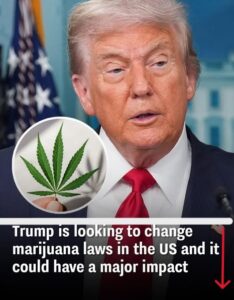Trump Administration Weighs Major Federal Marijuana Policy Overhaul Amid Industry Pressure

President hints at possible cannabis reclassification, a move that could reshape U.S. drug laws and open new economic doors
The Trump administration is considering what could be one of the most significant changes to American drug policy in decades — reclassifying marijuana at the federal level. President Donald Trump confirmed that his team is reviewing whether cannabis should remain on the government’s strictest list of controlled substances, a decision that could carry sweeping legal, economic, and social consequences.
The idea surfaces during a period of rapid change in public sentiment. A growing majority of Americans now support some form of legalization, and states across the country have already established their own medical or recreational cannabis programs. Federal reclassification could bring national policy closer to this reality while easing tensions between Washington and state governments.
The Current Status: Marijuana as a Schedule I Drug
Under the Controlled Substances Act, marijuana has been classified as a Schedule I substance since 1970, a category reserved for drugs deemed highly addictive and without accepted medical use. This classification — the same one applied to heroin and LSD — has carried heavy consequences.
For decades, cannabis businesses have been barred from claiming standard tax deductions and forced to operate largely in cash because banks avoid serving companies tied to federally illegal substances. On the criminal justice front, the classification has fueled mass arrests and incarceration, disproportionately affecting communities of color.
Historians note that marijuana’s initial prohibition had as much to do with politics and racial biases as it did with health risks — an origin story that continues to shape the reform debate today.
Trump’s Public Remarks: Cautious but Significant
Speaking at the White House, Trump acknowledged the administration’s review process.
“We’re looking at it. Some people like it, some people hate it… we’ll make a determination over the next few weeks,” he said, adding that the topic is “very complicated.”
His comments suggest that any decision may attempt to separate medical marijuana from recreational use, potentially loosening restrictions for patients while maintaining tighter controls on non-medical consumption.
Medical vs. Recreational: Finding a Middle Ground
Trump’s emphasis on medical use mirrors public opinion polls, which show overwhelming support for cannabis as a treatment for chronic pain, epilepsy, PTSD, and other conditions. Advocates argue that keeping marijuana in Schedule I limits medical research and denies patients access to effective therapy.
By focusing on the medicinal aspect, the administration could frame reclassification as a health-driven reform rather than a full legalization push — a move that might win over some skeptics while still delivering significant policy change.
Economic Stakes: Billions on the Table
The cannabis industry has grown into a multi-billion-dollar sector in states where it’s legal, creating jobs and generating tax revenue. Federal reclassification could further unlock economic potential by:
-
Allowing cannabis companies to access traditional banking.
-
Enabling standard tax deductions.
-
Encouraging investment in related industries like agriculture, manufacturing, and retail.
Recent reports noted that Trump attended a high-dollar fundraiser with industry leaders just days before his remarks — a sign that business interests are closely watching the administration’s next move.
State-Federal Conflict
Dozens of states have legalized marijuana in some form, but federal prohibition creates a maze of conflicting rules. Trump acknowledged this divide, noting that “states have their own laws.”
Reclassification wouldn’t automatically legalize marijuana nationwide, but it could reduce penalties, align federal rules more closely with state programs, and create greater consistency for businesses and consumers.
Public Health and Safety Concerns
Opponents of reform often cite fears about youth access, impaired driving, and long-term health risks. Trump touched on these worries, warning about the potential harm to children. However, data from legalized states has not shown dramatic increases in youth usage, and research suggests regulated markets can mitigate some risks.
Criminal Justice Implications
Changing marijuana’s federal classification could ease pressure on the criminal justice system. Reduced penalties would prevent many low-level arrests, particularly in communities disproportionately targeted under current laws.
Reform could also open the door for those serving time on marijuana charges to have their sentences reduced or overturned.
Political Landscape
Any federal shift will face both support and resistance. While many conservatives remain wary, there is growing bipartisan backing for reform — especially regarding medical marijuana. Industry leaders, patient advocates, and criminal justice reformers form a powerful coalition pushing for change, while some law enforcement groups and anti-drug organizations remain firmly opposed.
With public opinion shifting and the economic stakes rising, the Trump administration’s decision in the coming weeks could mark a turning point in America’s decades-long debate over cannabis.